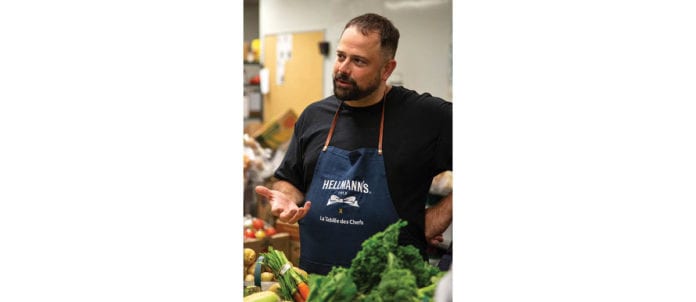Jean-François Archambault has long been a champion of sustainable food-recovery programs. In fact, in 2002, at the age of 24, he decided to start La Tablée des Chefs. The mission was relatively new at the time: to connect food companies and foodservice establishments with surplus food to community organizations in need.
It was a challenge in the beginning, in part because of concerns over liability, he says. “[Restaurants] were all for it, but management thought it might be too risky if food was mishandled.”
But it all started coming together when he was able to sign on Montreal’s Bell Centre in 2005. “It was the first major food outlet that joined the program,” he says. “It was the
door opener we were looking for because it was the biggest food outlet in the city. Then it was easier to convince others to sign on.”
Today, La Tablée des Chefs has 120 foodservice establishments recovering more than 350 tons of meals annually — enough to feed 800,000 people. Clients include Saputo Stadium, Scotiabank Arena, Rogers Arena, BC Place and BMO field, make a bigger impact.” Beyond the networking part of the job, another key mission is educating staff and youth on socially responsible practices. In 2006, it established Kitchen Brigades, a 24-week extracurricular high-school culinary program now in 180 public high schools in Canada and run along with several hotels and other establishments from small independents to large-scale operations. The organization is now working on launching programs in Mexico and France.
With the increasing focus on food waste, the sharing of surplus food with those in need is not only acceptable, it’s something operators of all sizes are seeking. But establishing and sustain- ing those connections with the right community groups can be a logistical challenge for many, Archambault explains by local chefs. “Part of the program is [focused on] transferring knowledge and skills around food waste,” Archambault explains.
In 2019, La Tablée introduced a new culinary summer camp for youth aged 10 to 15 in Quebec. It adds a strong social component, from participating with local charitable organizations, to workshops on fighting food waste, to exploring urban agriculture and local food sources.
The organization has received a number of awards for social innovation and community support. It reached a major milestone in 2018 when the Quebec government announced $5-million
He describes La Tablée des Chefs as the missing link that connects the two. “We develop turnkey programs with chefs and provide everything they need to ensure fresh and frozen food is set aside and picked up on a regular basis — and that it’s all seamless and well maintained.”
The partnerships have to make sense or they won’t necessarily succeed over time, he adds. “In some cases, a smaller restaurant donating limited quantities to a local organization, like a women’s shelter, can in financial assistance over five years. Since his days of having to convince establishments to join his program and overcome their concerns over reputational risk, Archambault says the tables have turned completely.
“If a restaurant in 2020 is not engaging in food-recovery or food-waste programs and not looking at their environmental footprint — that’s just bad for their reputation.”
Written by Denise Deveau


















